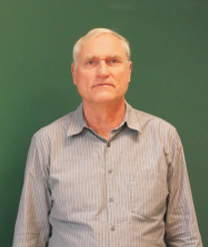| 發刊日期 |
2014年12月
|
|---|---|
| 標題 | 有朋自遠方來─ 專訪 Richard Schoen 教授 |
| 關鍵字 | |
| 檔案下載 | |
| 全文 |
策 劃 : 劉太平 
Richard (Rick) Schoen 教授 1950 年出生於美國俄亥俄州的小鎮 Celina。
1972 年獲得 Dayton College B.S. 學位, 1977年獲得史丹佛大學 Ph.D 學位。 劉太平 (以下簡稱「劉」): 首先, 謝謝你來訪。 大家跟我說很喜歡你在許振榮教授紀念講座的系列演講1 1 許振榮教授紀念講座, 「微分幾何與相對論的近期發展 Recent progress in differential geometry and relativity」, 2013年12月2日至4日在中央研究院數學所舉行。, 很抱歉那時我不在, 不能聽你演講。 讓我先直接提出一件大家想知道的事, 也就是你與丘成桐2 2 丘成桐 Shing-Tung Yau (1949$\sim$), 華裔美籍數學家, 1982年獲頒菲爾茲獎, 主要研究領域為微分幾何。 在史丹佛開始做研究的情形。 我聽說你們兩人一起非常努力的工作, 得到解決正質量猜想 (the positive mass conjecture) 這個卓越的成就。 可否描述一下那段時光? Richard Schoen (以下簡稱「S」): 實際上正質量猜想是我們一起做的第三或第四個問題。 那是我畢業後一年完成的。 我在 1976 年畢業離開史丹佛。 這問題是1977/1978年在柏克萊做的, 那年丘成桐正在柏克萊訪問。 當我還是研究生的時候, 我們已有一些合作, Leon Simon3 3 Leon Melvyn Simon (1945$\sim$), 數學家, 美國文理科學院與澳洲科學院院士, 對幾何測度論有重要影響。 也參與合作。 Leon Simon 是我的指導教授, 我有兩位正式的博士論文指導教授。我們有一篇三方合作的論文, 是我的第一篇論文, 我覺得是篇很好的論文, 標題是「極小超曲面上的曲率估計 (Curvature estimates for minimal hypersurfaces)4 4 Schoen, R., Simon, L. and Yau, S. T., Curvature estimates for minimal hypersurfaces. Acta Math. 134 (1975), no. 3-4, 275-288.」。我想這篇論文有很大的影響, 這是篇側重分析的文章, 討論在極小面積條件下, 如何限制極小超曲面的曲率。 我們用到體積二階變分 (second variation of volume) 的穩定性。 劉: 你先與Leon及丘成桐合作, 之後單獨與丘成桐非常密集地合作, 那是怎樣的情況? S: 是慢慢開始的。 我當研究生第二年時修了 Leon 的偏微分方程課, 我非常喜歡第一學期的內容, 所以在學期結束後, 開始跟 Leon 閱讀一些極小子流形(minimal submanifolds)方面的文章。 丘成桐的辦公室就在走廊的正對面。 我對推廣這些東西有了一些進展, 丘成桐感到興奮, 加入討論, 我們是這樣開始合作的。 我覺得 Leon 和丘成桐兩人的風格很不同。 那時丘成桐剛畢業, 他大概只長我兩歲或更少。 他幾乎是住在辦公室, 雖然有間公寓, 但是從清早到深夜都待在辦公室, 聽很多課, 非常有雄心壯志, 我從來沒遇過像他那樣的人, 與他合作很有意思。 另外要聽懂他的話是一段很辛苦的過程, 這是另一個挑戰。 雖然那個時候他一點都不有名, 但我感到很有挑戰、 非常興奮。 他渾身煥發出的企圖心與活力, 非常吸引我。 另一方面, Leon 比較系統化, 他也是非常聰明的人, 但是處理問題比較按部就班。 比起丘成桐他更為專注, 更集中在某些方向。 劉: 我聽說要做正質量這個問題, 必須讀很多物理與數學的文獻, 甚至連問題要怎麼陳述都不明顯。 S: 數學文獻中有一些提法(formulation)。 芝加哥大學的 Robert Geroch5 5 Robert Geroch (1942$\sim$), 理論物理學家, 主要研究廣義相對論與數學物理。為數學家講授相對論中有名的問題, 正質量猜想就是其中之一。 所以一些測試的情況已有非常清楚的陳述, 可以著手進行。 不過漸進行為和所需的條件並沒有精確的描述, 我想我們把它描述出來了。 剛開始, 我們得到的定理有些弱, 漸漸地加強, 最後得到一個最完整的定理。 談到物理的學習, 即使我學的是微分幾何, 我只知道一些愛因斯坦度規 (Einstein metrics), 但在開始做正質量理論之後的那幾年, 我學到的物理比過去所知的還要多。 我是在做這個問題時, 才真正踏入相對論。 現在我和許多研究相對論的學者討論, 他們都是物理博士。 今天我對這領域的物理內涵, 比剛開始時有更深的體會。 劉: 你和丘成桐合作之前, 丘成桐做不做廣義相對論? S: 我們兩個都不是真的在廣義相對論領域, 那時候我們都在學習這方面的背景。 我們先有一個方法證明這個定理的特殊情形, 由此出發終於證明了完整的定理。 劉: 聽來非常令人興奮, 兩個年輕人走出一個全新的方向。 S: 是興奮, 每個人對這個定理都很興奮。 馬上在相對論社群中激起一個大水花。 我覺得相對論有好的物理基礎, 但最後的模型非常數學。 所以與重力質量有關的想法及其它由相對論衍生而出的想法, 其實與微分幾何的想法非常相近, 因此我們能夠把均曲率變分理論 (mean curvature variational theory) 的想法用到這個問題上。 這個數學方法很適合這個領域。 我可以這麼說, 我們的工作讓這個領域有了很大的改變, 現在做相對論的人都知道我們的定理。 就在今天早上聽到 Sergio Dain6 6 Sergio A. Dain (1969$\sim$), 現任教於阿根廷Universidad Nacional de Cordoba。 在演講中談到和我們相同的想法, 不過是在一個新的脈絡之下。 他是物理博士, 但是很數學。我想我們的工作有很大的影響。 劉: 現在往回想, 你覺得你們當初為什麼能夠成功?那時候, 在分析上你有堅實的基礎, 你們兩人又那麼年輕, 不畏懼任何事情, 願意學習繁多的新領域, 必須閱讀大量論文, 從中找出其精神所在, 並融會貫通成你們自己的語言, 你們還發展了理論, 你們做了那麼多的事! S: 我覺得做數學, 拓寬視野非常重要。有時候有些看起來離你做的好像很遙遠的東西, 其實是很近的。 以我們上面提到的這個問題來說, 有很多人在數學與物理之間做交流傳達, 例如我提過的 Geroch 以及一些其他非常數學的物理學家, 在一定程度上懂得兩邊的語言。 柏克萊當時就有一些這樣的人。 Jerry Marsden7 7 Jerrold E. Marsden (1942$\sim$2010), 應用數學家, 加拿大多倫多菲爾茲數學科學研究所的創辦人之一, 是數學與古典理論動力學界的權威領導人之一, 並為辛拓樸奠定大部分的基礎。就是一位非常數學的物理博士, 他可以直接為我們解釋正質量理論之類的事情, 所以在柏克萊就有人可以討論。有個相對論的團隊, 成員包括很出色的相對論學家 Abe Taub8 8 Abraham Haskel Taub (1911$\sim$1999), 美國數學家與物理學家, 對最早期廣義相對論、 微分幾何與微分方程有重要貢獻。與 Ray Sachs9 9 Ray Sachs (1932$\sim$), 數學家, 研究廣義相對天體物理學與天文物理, 1985 年之後轉而研究數學與計算生物學, 特別是放射生物學。, 他們就在數學系, 確實對我們有幫助。 我認為和這些人討論非常重要, 有時候僅僅從瞭解人們如何表達自己, 學到的還比讀一本書 更多。 劉: 為什麼你們兩人可以解決這個問題, 而其他在柏克萊的人不能? S: 喔, 他們沒有極小曲面方面的數學基礎。對於極小化(minimization)、 均曲率(mean curvature), 這些理論可以用來做什麼等等, 我們有更深刻的瞭解。 我覺得差別就在這裡。物理學家在這個領域有很好的訓練, 但是他們沒學過數學工具。 你也知道, 如果要做非線性偏微分方程相關的東西, 除非可以建立理論並進行一些嚴密的計算, 否則就連對解的行為的臆測 都不可靠。 劉: 你接著解決了山邊問題(Yamabe problem), 這似乎與正質量定理有些關聯。 S: 解決山邊問題, 是因為我領悟到, 這個問題與正質量定理的一個特殊情況非常相近。 這是個懸而未解的問題。 大家對解爆破(blow up)的可能形態已經有相當詳盡的想法。 對如何把問題正則化, 也有各種自然的方式。 這些理解讓你可以探討相近問題的解如何爆破。 接下來就要證明爆破其實不會發生。 我意識到, 當爆破發生時, 可以適度更換尺度, 製造出一個愛因斯坦方程的趨近扁平解 (asymptotically flat solution)。 我接著想到正質量理論, 它正好提供更正項(correction term), 起碼在低維度可以做到, 使得解不會爆破。 主要的想法其實就是這樣。確實, 做正質量理論和趨近扁平流形的經驗, 正是理解山邊問題的關鍵。 劉: 我可不可以這麼說:是的, 正質量的文章發表了, 激起了大水花, 大家都注意到了, 但是你是唯一對此有深刻感覺的人? S: 在那時候, 是的。我想當時大家沒體會到正質量定理有多重要。 之後, 它被用來做許多事情, 特別是在相對論上, 比如 Schwarzchild 解在靜態黑洞 (static black holes)中的唯一性。 有許多應用, 靜態星的旋轉對稱就是用正質量定理證明的。 大家知道正質量是一個重要的物理問題, 但是沒想到也可以用它作為工具, 來解決其它問題。 我看出正質量理論的彈性可用, 這一點我想我應該有些功勞。 劉: 那是因為你有深刻的理解。 S: 80年代做山邊問題時, 只有少數人懂得正質量定理, 我是其中之一, 這是事實。 劉: 讓我岔開話題, 等一下再回到幾何。你做深入的分析研究, 也解決幾何上的重要問題, 你怎麼看偏微分方程與幾何這兩個領域? 或許也可以說說你對做偏微分方程與做幾何的人的看法。
S:
嗯, 我不想冒犯任何人。
我開始做研究的時候, 大部分做微分幾何的人對偏微分方程一無所知, 即使所有微分幾何的問題都可以用偏微分方程來呈現。
他們完全不知道該如何實際解出一個偏微分方程、做估計, 或是其它這類的事。
反過來說, 做偏微分方程的人完全不懂幾何。
當一個偏微分方程不是用明顯的坐標寫出來時, 他們會覺得很不自在,
所以這兩個領域之間有一道溝, 隨著時間慢慢被填滿。
這種情況在 1980 年代我還是這領域年輕的研究者時, 相當極端。
老實說, 我可以做一些其他人做不到的事, 一個原因是因為我可以結合這兩個方向。 劉: 我知道你視野寬闊, 想法開放。 S: 我開過一次Navier-Stokes的課。 劉: 偏微分方程與幾何這兩個領域, 都出了一些非常出色的數學家, 這兩個領域的人很不同嗎? 思考方式差異大嗎? 當然, 這是兩個不同的科目。 S: 我想所有數學家都擔心被人帶著哲學性的眼光來評價, 對吧? 部分歸因於偏微分方程的人擔心幾何學家對他們的工作做出不盡公平的判斷, 反之亦然, 這是個問題。 所以大家想要歸屬於某個團隊, 好得到團體的支持。當然, 要自外於這樣的圈子是有困難的, 年輕人更要小心。 我們對數學家的評論, 如果能以他們的工作為準, 而不是他人認定其所屬的領域, 那就太好了。 但我想任何系所在新聘或進行其它這類事情時, 總會有領域地盤的考量, 這樣的考量是很自然的。 每個人對自己的團隊歸屬, 堅持的程度很不同。 劉: 你的回答很有趣, 但是跟我的思路不同。 你說偏微分方程的人去學幾何很重要, 但似乎因為歸屬感所造成的心理因素, 讓他們不這麼做。 會不會也是由於幾何需要另一種思考? 如果你專注在偏微分方程一陣子, 再去學習另一種思考, 可能有難度。 是否可以這麼說, 這需要不同類型的才能?
S:
是有可能, 觀察別人怎麼工作很有趣。
當有了一個問題, 是先畫個圖, 看看有什麼想法? 或者 劉: 更不要說這樣才能教育好下一代。 S: 是的, 這還關係到對學生而言你樹立了什麼樣的榜樣, 教的課程內容以及和年輕人互動的方式, 我覺得都會有影響。 劉: 你出身於俄亥俄州的農家。我對農家出身的人總有一些好感。 S: 我想你也是吧。 劉: 是的, 不過我們做的農務似乎不同。 除了我們家的水牛, 我沒接觸其他動物。 你比較多才多藝。 S: 我年輕時做過許多農務, 這倒是真的。 劉: 你在成長過程中, 除了農務, 還是位好學生, 是吧? S: 事實上我們家的小孩幾乎都是優秀的學生, 我們是個大家庭, 我想至少有五個或六個中學時是以第一名畢業。 劉: 是因為優良基因? S: 也許吧。 還有, 我是家裡排行比較小的, 初中時, 我哥哥已經上大學了。 他在大學主修數學, 把他的數學書給我, 讓我很早就受到影響, 這也是我那麼早就對數學有興趣的原因之一。 對我來說, 在農場長大的好處就是很自由。 我需要分擔工作, 但是因為我們家人手多, 所以也有很多空閒的時間, 來發展自己的興趣。 我認為數學家必須能獨立, 必須固執地追尋一些其 他人也許不會有興趣的事情。 所以農家成長的背景和數學家所需的特質是一致而有幫助的。 劉: 每天都有夠長的時間沒人理你。 S: 是, 幾乎整天。 劉: 你母親生了幾個小孩? S: 13個小孩, 我是第10個。 劉: 她還很健朗嗎? S: 大概兩年前她在 100 歲的時候過世。 劉: 除了你以外, 我不認識其他有13位兄弟姐妹的人。 S: 的確, 真的不常見。 我以前有個學生有 8 位兄弟姐妹。 劉: 我自己手足一共7人, 我想我們的年代兄弟姐妹多的比較多。 S: 是的, 我其實算是屬於比較老的一代。 劉: 你的數學生涯中曾接觸許多人, 當中有頂尖的數學家, 有哪些人在某些方面給你留下深刻的印象? S: 有很多很了不起的數學家。首先, 也許資深的與資淺的要分開來談。 每次聴Jean-Pierre Serre10 10 Jean-Pierre Serre (1926~), 法國數學家, 1954 年獲頒菲爾茲獎, 2000年獲頒沃爾夫獎, 2003年得到阿貝爾獎。在代數拓樸、代 數幾何及代數數論上有重大的貢獻。 演講, 我都感到敬佩。 我想他已經超過80歲了, 他用黑板給的演講精采絕倫。 他顯然在講解數學和研究上都是大師。 這樣的人, 是我心目中地位崇高的典範。在我的領域也有很多出類拔萃的人, 丘成桐一直都是我的榜樣。 在我學術生涯的早期, 他絕對是我的榜樣。這些年來他傾向廣泛涉獵, 參與許多事情。 目前我個人沒辦法仿效這樣的作法, 但他對我肯定有重要的影響。 我領域中的 Misha Gromov11 11 Mikhail Leonidovich Gromov(1943~), 法籍俄裔數學家, 在幾何學方面貢獻卓著, 1993 年沃爾夫獎和2009年阿貝爾獎得主。 毫無疑問是位有趣的數學家。 有時候他的工作會有點抽象, 不好理解, 但他所發展出來的幾何領域或是子領域,無庸置疑,影響深遠。 劉: 你寫過一些書, 是否計劃寫比較基礎入門的書? S: 我手邊有一些不同類型的上課講稿, 有一套廣義相對論的講稿, 還有一套比較一般的幾何偏微分方程的講稿, 也許當我沒有問題可做時, 會考慮整理一下。 我不怎麼喜歡把時間用來成書定稿, 決定做哪些事必須衡量輕重緩急; 如果我覺得出版這些材料, 對這個領域有重大的影響, 我也許會做。 但現階段還不是時候, 我寧可花時間做新問題。 劉: 最近你想的是哪些方向? S: 我還在做與相對論相關的事情。 上星期還是幾天前, 我在演講中講關於愛因斯坦方程局部化的解 (localizing solution)。 這領域還有好幾個極好、尚未解決的問題。 幾年前我對黎曼幾何的一些問題感到興趣, 這個科目對我而言還是非常有趣, 例如正曲率流形(manifolds on positive curvature)的研究。 四、五年前我在這方面證明了一個很好的定理 $-\!-$ 微分球形定理(differential sphere theorem)。 本來希望這個定理可以把這個主題拓展得更寬, 但是卻碰到更多的困難。我當然還是對與正曲率相關的問題非常感興趣。 這些是我現階段思考的問題, 還有一些長期關注的問題, 我想我會再回去看。 通常都是因為學生的關係而回到舊問題或是開始探討新的問題。 我幫學生找問題的時候, 總是挑一些我認為有趣, 但沒做過或是沒時間做的問題, 通常這些問題也會幫我發展出新的方向。這是我覺得帶學生對我很重要的原因之一。 我不是那種每天在辦公桌前一坐十小時找新東西的人。 做新問題需要很投入, 帶 學生會驅策你開始並前進。 劉: 這對許多帶學生、當指導教授的人是個好建議。到目前為止你有幾位博士學生? S: 我想到今年(2013)為止有37位畢業生。 數學譜系計畫上我的數學後代已經超過100人。 劉: 除了李瑩英12 12 李瑩英, 台灣數學家, 主要興趣是微分幾何, 目前任教於台灣大學數學系。, 你還有別的學生在亞洲。 在韓國也有一些, 對吧? S: Jaigyoung Choe13 13 Jaiyoung Choe (1953~), 韓國數學家, 主要興趣是微分幾何, 目前任職於韓國高等研究院。 在韓國高等研究院(Korea Institute for Advanced Study); 山田 澄生14 14 Sumio Yamada 山田 澄生, 日本數學家, 現任教於日本東北大學大學。 在日本東京; Tom Wan15 15 Yau Heng Tom Wan, 中國數學家, 現任教於香港中文大學。在香港。 我想真正在亞洲的就這些了。 最近有 Martin Li, 明年(2014)回香港。 將來在亞洲我應該會有更多的學生。 我想越來越多亞洲數學家回歸本土。 我有不少亞洲學生大部分都留在美國。 我的 37 位學生裡, 也許有多於三分之一, 將近一半是亞洲人。 亞洲人喜歡我的領域, 他們在分析與幾何方面有不錯的訓練。 劉: 來自亞洲的學生和美國本地學生, 一般來說, 有差異嗎? S: 首先, 現在幾乎沒有美國學生做分析, 這是我的印象, 我覺得領域的潮流是循環變動的。 現在美國學生最大的領域是數論和代數, 所以美國學生和亞洲學生在背景與目前想做的事上面有很大的差異。 一般來說, 美國與亞洲的大學系統很不一樣, 美國學生通常修的課比較不那麼進階, 但是思路比較寬廣; 亞洲學生通常修過一些專門的課程, 所以技術上, 在某些方面準備較為充分, 但這並不表示他們將來做得比較好。 做研究與修課很不同, 所以問題在於如 何從修課過渡到研究。 劉: 你是說在開始的階段, 中學和大學時代, 廣泛的興趣是重要的? S: 是的, 我是這麼認為。我覺得所有學數學的學生都該學一些物理。 最起碼要有一些物理概念, 特別是想往幾何方面發展的人。 我覺得重要的是大學生的數學訓練要廣, 也就是要懂得夠高階的代數和分析。 我不認同太早專攻特定的方向, 目前在美國有些學生有這個傾向, 他們覺得如果在拿到學士學位前, 還沒開始做研究就是落後。 事實上我不覺得真是如此。通常學士研究都不會引導他們到好的方向, 這是我擔心的。 所以我覺得美國國家科學基金會的學士研究經驗計畫 (Research Experiences for Undergraduates)16 16 www.nsf.gov/home/crssprgm/reu/start.htm, 以及對學士研究的大力強調, 好壞參半, 有好的但也有些不那麼好。 劉: 例如中學的奧林匹亞造成很多人做離散數學。 這是否能解釋為什麼一些優秀的學生往代數和數論發展?
S:
這是我的理論之一。
我覺得數學界過分看重這些競賽。
在美國要進一流的大學很不容易, 用來評分的標準之一, 就是學生在這些競賽有沒有出色的表現,
因此造成很多哈佛或是普林斯敦畢業的學生專注於那些方向, 我認為這有負面的影響。
另一方面, 可以讓學生專注的事就
是好事。所以我希望這些競賽的內容可以更廣一些, 多包含些技巧。
但是做偏微分方程或是 劉: 在那樣青澀的年紀!我總是把數論、甚至幾何的一部分或代數, 來和分析做比較, 就像比較中國文學中的詩與小說。 小說與詩非常不同。 中國的詩在唐代和宋朝有過非常光輝的過去。 那個時代, 中國社會對詩人多有推崇。 就小說而言, 中國遠不及日本, 更別提歐洲。 小說比較複雜, 需要有人生的體驗等等。 寫小說要在生活中歷練, 詩就有些不同。
S:
我懂你想要表達的觀點。我也覺得數學應該與真實世界有關聯。
很多豐富的數學內容來自與 劉: 你在農家成長, 是不是因此使得你能夠連結到真實世界?
S:
我後來與真實世界連結的方式並不是當初我所想要的。
事實上我讀大學時非常喜歡抽象的東西, 我喜歡泛函分析、邏輯, 抽象的機制一類,
這些都非常吸引我, 我想很多大學生也是這樣。
這也是為什麼我覺得不要太早選定研究方向很重要。
直到念研究所我才發現一些以前沒見過的領域, 所以才會強調數學要跟其它的領域結合。
這一點一直隨著我的數學經歷而演變, 應該與我研究相對論有關, 我認為微分幾何是與物理問題很有關聯的領域。
所以能夠跟一些不是專家的人解釋你的工作很重要。無論如何, 我覺得與其它領域結合是可貴的。
但同時我也覺得數學家還是要注意數學的品質, 而不只是為特定領域提供服務, 其間要 劉: 我聽過你的演講。大家都跟我說你是位非常好的老師。關於教學你有什麼想說的? S: 我自認教以內容為主的課我是位好老師, 我會用心盡量以學生可以瞭解的方式解釋內容, 當然必須先瞭解修課學生的背景。 在美國有些課的程度非常低, 教起來像遊藝課, 目的在吸引學生投入學習。 假定學生對課程內容有興趣而且想學, 在這個前提之下, 教這類型的課我是個好老師。 我教的課大多屬於這類。 劉: 所以你會好好準備。 S: 我會好好準備, 試著用學生可以瞭解的水平, 用不同方式解釋。 下學期我有個挑戰, 就是為大學生上黎曼幾何, 這是我們第一次開這樣的課。 這是延續大學微分幾何、 曲線和曲面的課程, 用 10 週的時間教他們黎曼幾何。 我想這會是個挑戰。 劉: 這也許是個很好的寫書題材。 S: 的確, 我花了不少時間找教科書, 也不確定選的書是否合適。 劉: 每次跟你談話都很愉快, 過幾年我們應該再這樣聚聚。 S: 謝謝, 很高興與你談話。 每次來台灣, 我都很愉快。 ---本文訪問者劉太平任職中央研究院數學研究所, 整理者陳麗伍曾任中央研究院數學研究所助理--- |
2014年12月 38卷4期
有朋自遠方來─ 專訪 Richard Schoen 教授

